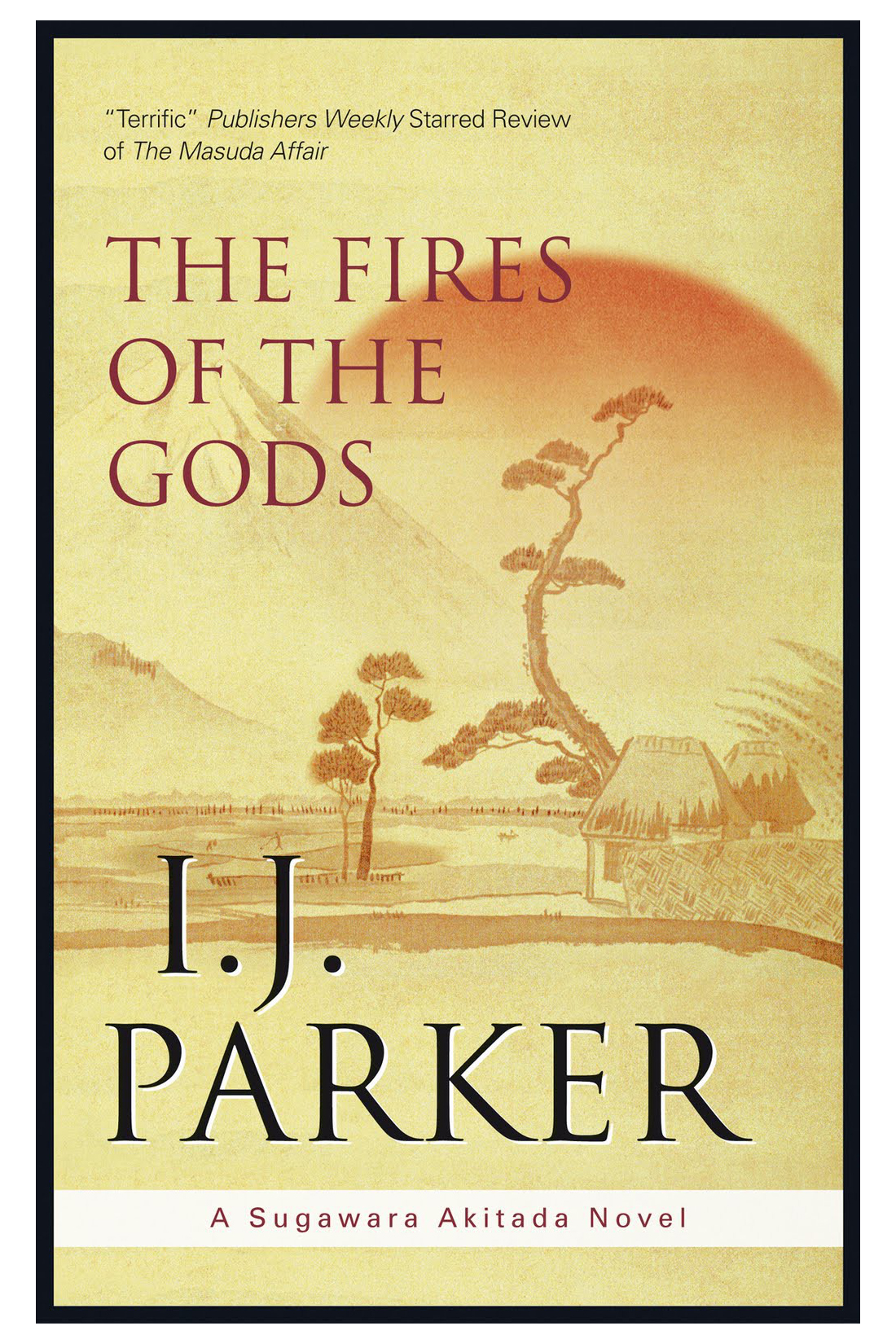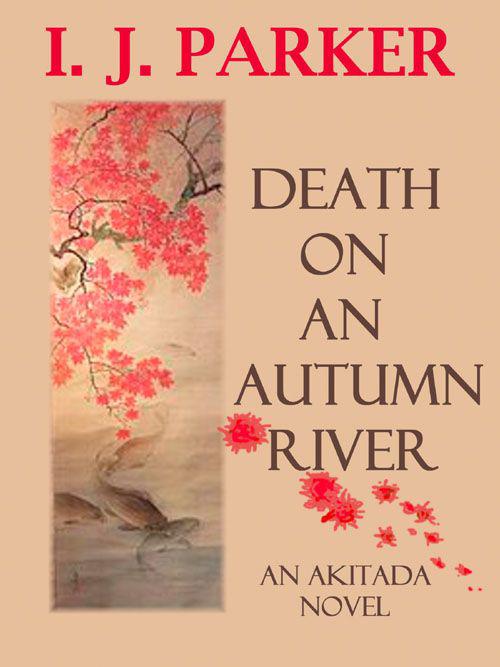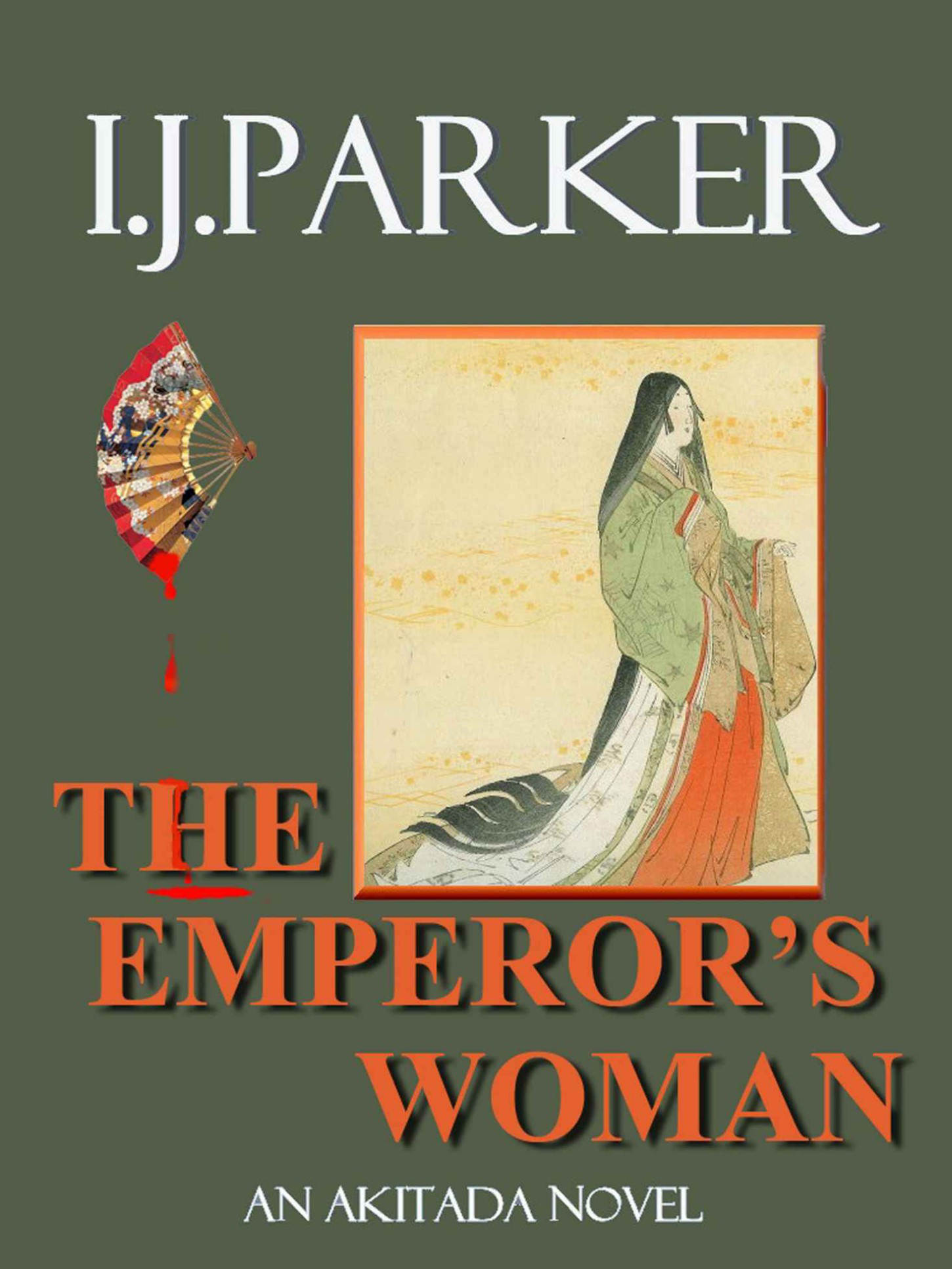I.J. Parker
Books: Mystery | Historical
Akitada: Rashomon Gate (2002), Black Arrow (2006), Island of Exiles (2007), The Hell Screen (2003), Akitada and the Way of Justice (2011), Three Tales of Love and Murder (2012), The Masuda Affair (2011), The Fires of the Gods (2011), Death on an Autumn River (2011), The Emperor's Woman (2012), The Crane Pavilion (2014)
Akitada
Rashomon Gate (2002) #2
 Akitada, is an official in the Ministry of Justice, who is bored with his job. But he has to support his mother and two younger sisters, so he does his best. His mother wants him to make a good marriage so he'll move ahead in the world, but Akitada likes getting involved in mysteries and seeing justice done.
Akitada, is an official in the Ministry of Justice, who is bored with his job. But he has to support his mother and two younger sisters, so he does his best. His mother wants him to make a good marriage so he'll move ahead in the world, but Akitada likes getting involved in mysteries and seeing justice done.
He's also loyal, and when the university instructor who took him in asks for his help, he drops everything to assist.
Unfortunately, the situation is complex, and there are more problems than it first seems, including the grandson of a man who was miraculously taken up to heaven being all but abandoned at the university.
And there's also the matter of Hirata's daughter, Tamako.
There is obviously backstory that I missed from previous books/stories but I didn't miss it in the slightest.
The mystery was good, but I have to admit what fascinated me the most were the historical details and the world of 11-th century Japan.
I just picked up a collection of Akidata short stories, so I definitely plan on reading more.
The only thing that bothered me is that Grandmom isn't around, because I think she also would have enjoyed this.
Published by Ingrid J. Parker Inc.
July 2012 | Rating: 7/10
Black Arrow (2006) #3
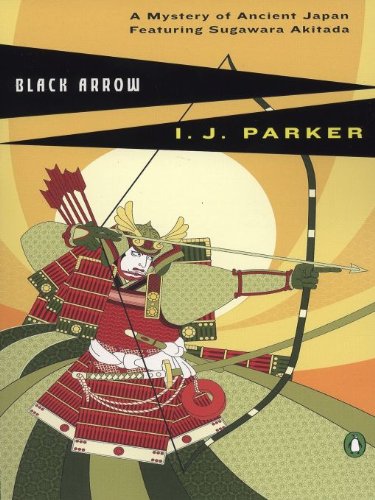 Set in Echigo Province, JAPAN GODS-ABSENT MONTH (NOVEMBER), A.D. 1015
Set in Echigo Province, JAPAN GODS-ABSENT MONTH (NOVEMBER), A.D. 1015
Akitada has been sent to Echigo as provisional governor, and discovers that there are many problems at his new post, from the decrepit compound to a possible revolution to outcasts possibly harboring fugitives.
Plus the fact that the winters are long and isolating.
I liked the historical and political aspects of this story, as well as the murder mysteries.
Under the Chinese system, a judge had to watch as his sentence was carried out, and Akitada wondered at Hisamatsu's interest in the various torturous methods of killing a man or woman. He seemed to take inordinate pleasure in detailing their finer points.
And I really like Akitada. He's quite human.
Akitada chafed at this and at the fact that Kaoru had taken over and was giving the orders, but he submitted. He felt badly out of his depth.
It's an interesting series, and I'm enjoying it.
Published by Penguin Books
August 2016 | Rating: 7.5/10
Island of Exiles (2007) #4
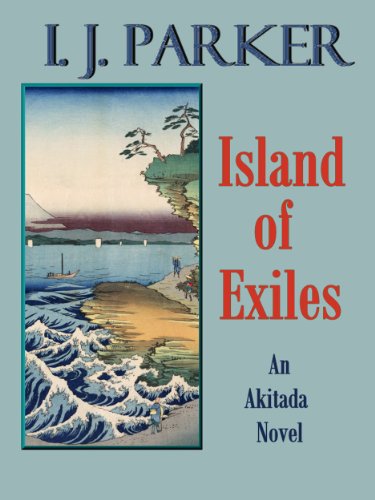 The prince in exile has been murdered, and the son of the governor of the island of exile has been accused. Two men from the Imperial City have come to seek Akitada's assistance in solving the murder.
The prince in exile has been murdered, and the son of the governor of the island of exile has been accused. Two men from the Imperial City have come to seek Akitada's assistance in solving the murder.
I didn't care as much for this; parts of the story dragged on and on. There are some books where a character recovers from serious injury that are well done and interesting. This passage was slow and ponderous and seemed to focus on the suffering and misery rather than the spirit needed to recover. Not that there weren't glimpses of that, but they were overwhelmed by the grim descriptions of the beatings and injuries.
The mystery itself was interesting and complex, I just got bogged down in the misery.
But to end on a more upbeat note:
I often wonder if this place makes some men pursue grand schemes because their world has become as small as a grain of sand." She turned back to Akitada. "You are a good man and a man of honor. May you find happiness in the small things."
I quite like that.
Published by Penguin
August 2016 | Rating: 6/10
The Hell Screen (2003) #5
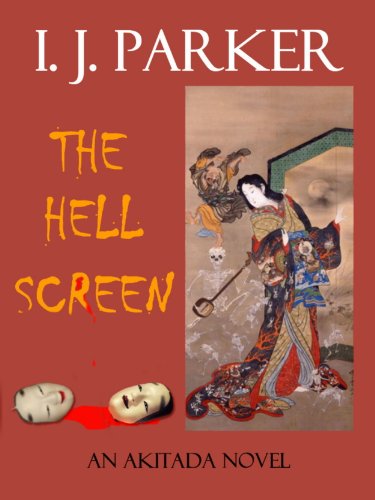 I was trying to figure out what I was in the mood to read, when I stumbled across The Hell Screen and remembered that I have the Lord Sugawara Akitada mysteries.
I was trying to figure out what I was in the mood to read, when I stumbled across The Hell Screen and remembered that I have the Lord Sugawara Akitada mysteries.
Akitada is returning to the capital after receiving notice that his mother is dying. On his way he spends the night at a temple where he is shown an amazing and horrifying work in progress: a Hell Screen to help convince viewers to change their ways.
What kind of faith was this that celebrated human suffering, and what sort of mind could call up such scenes of horror and agony?
Akitada is awakened in the night by a woman's scream, but it is not until he returns to the capital that he learns that a woman was murdered. Partially to escape the cruelty of his dying mother, and partially because of his own curiosity, Akitada looks into the murder.
This was a complex and fascinating mystery. There is the mystery of the murdered actress, the mystery of why Akitada's mother hates him, and Akitada also stumbles upon a haunted temple where people who live nearby turn up mutilated or missing.
I also like the various people Akitada and his retainers meet during the course of their investigations.
The cook shouted across, "The only spirits he calls up are in his cup. He's a hard drinker." Harada, far from taking offense, said, "On the contrary, my friend of the steaming pots. Drinking is the easiest thing I do. The world rests heavily on my shoulders and the worries of my days fray at my nerves."
"(I)t's like this: When he's out of sorts, he drinks. After the first cup he feels more like himself. So he has another and now feels like a new man. But the new man wants to drink, too, and so he goes on drinking till, pretty soon, he feels like a babe . . . bawling and crawling all the way home."
I really liked this book, and it reminded me that I like this series and that I should read more.
Published by Ingrid J. Parker Inc.
August 2016 | Rating: 8/10
Three Tales of Love and Murder (2012) #6
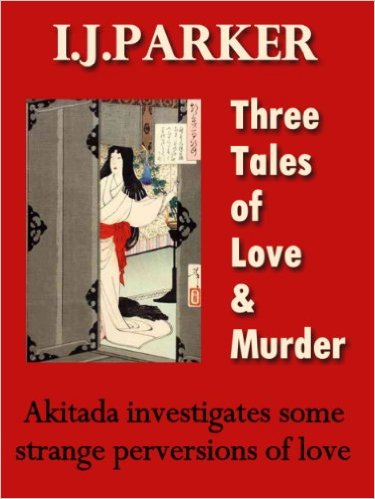 Set in Heian-Kyo (Kyoto) in 11th century Japan.
Set in Heian-Kyo (Kyoto) in 11th century Japan.
These are three Akitada short stories/novellas, all about love and murder (of course, from the title).
Death and Cherry Blossoms
Heian-Kyo (Kyoto), during the Flowery Month (May)
This finds Akitada at the start of his career, a poor junior clerk who has a penchant for getting involved in mysteries.
High honors at the university and employment in the ministry had not helped him compose romantic poetry, a grave fault in an age which valued such things more than learning or character.
Akitada is sent to the country to deliver the settlement documents for a marriage between Lord Kiyowara and Lord Kose's daughter and son. But there is, of course, a murder, and Akitada sees it as such, even as the families to to claim the death was a suicide.
The Incense Murders
Heian-Kyo (Kyoto), during the Clothes-Lining Month (March)
Akitada, still a poor junior clerk, is given a task by his mother.
(O)n this occasion she would get him involved in a case that nearly ended his career and perhaps his life. He would forever after fear dealings with his parent and doubt himself.
His uncle Koremori is rich, and holds that over Akitada's mother, since Akitada stands to inherit after Koremori's death.
Instruments of Murder
Heian-Kyo (Kyoto), Leaf-changing Month
This was the weakest story in the group, set after Akitada has become Lord Sugawara, and finds Akitada mixed up in the murder of a wrestler.
I just had a difficult time believing the various twists and turns of the plot here.
Published by I. J. Parker Inc.
August 2016 | Rating: 7/10
The Masuda Affair (2011) #7
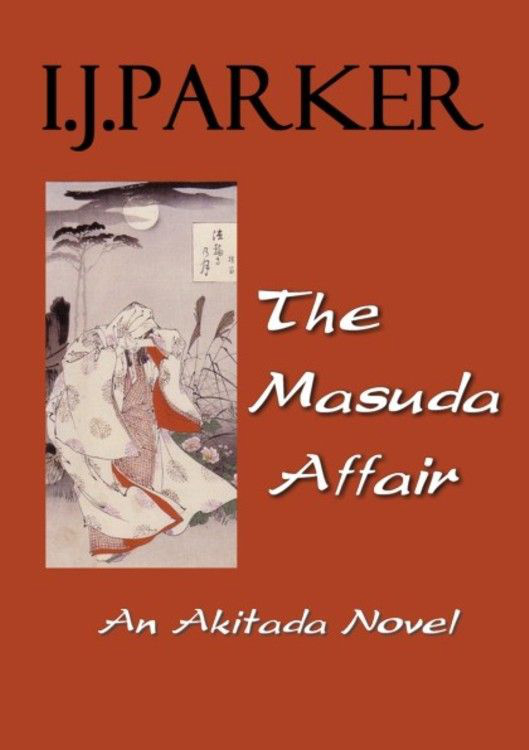 Akitada is struggling to deal with the death of his son in a smallpox epidemic, when he comes upon a small abused boy alone in the rain. Rescuing the boy has far greater consequences than he could have imagined, when this draws Akitada into the death of a high-ranking courtesan.
Akitada is struggling to deal with the death of his son in a smallpox epidemic, when he comes upon a small abused boy alone in the rain. Rescuing the boy has far greater consequences than he could have imagined, when this draws Akitada into the death of a high-ranking courtesan.
The poets called it the 'darkness of the heart', this inconsolable grief a parent feels after the death of a child, a despair of life that clouds the mind and makes a torment of day-to-day existence.
On the homefront, Tora has fallen in love with a dancer and kept his marriage secret from Akitada, but her kidnapping places everyone in jeopardy.
the psychological concept called 'the darkness of the heart' serves to some extent as the theme of this novel. Almost a commonplace in the literature of the period, which made much of human emotions, it refers to the dilemma faced by parents who lose a child. Although Buddhist doctrine insists on denial of all worldly attachments, a parent's love for and the bitter grief attendant on the loss of a child cannot be denied.
Akitada's grief over his son, and how he and his wife come to terms with their grief and recriminations is very touching. It's also interesting how Akitada learns to overcome his prejudices.
Published by IJ Parker
August 2016 | Rating: 7/10
Akitada and the Way of Justice (2011) #5
 This is a collection of eleven short stories featuring the 11th century Japanese "detective" (there wasn't such a term at the time) Akitada, over the span of his career, from the first mystery he was involved in to one towards the end of his career.
This is a collection of eleven short stories featuring the 11th century Japanese "detective" (there wasn't such a term at the time) Akitada, over the span of his career, from the first mystery he was involved in to one towards the end of his career.
I quite enjoyed this collection. All these stories are a fascinating glimpse into 11th century Japan, but it's more than that, because the characters are well written and complex, especially Akitada.
Published by Ingrid J.Parker Inc
July 2012 | Rating: 8/10
The Fires of the Gods (2011) #8
The capital is plagued by unexplained fires, and panic threatens to break out, but Akitada has his own problems to worry about. His ailing wife expects a child and he loses his job to a political appointee. When he tries to confront the nobleman who is responsible for his dismissal, he ends up suspected of his murder.
There are two primary mysteries: the death of the official and the fires set throughout the capitals.
There are several passages in this book I quite liked. First is when Tora gives Akitada a silk pouch he found at the scene of the fire.
'The silk is very good, and there's something inside.' He started to open it.
Tora said quickly, 'Don't! You'll break the spell.'
'What do you care? It's not your spell.'
'Oh.'
That's probably a very good description of Tora.
I also quite like the thief that Tora helps (and that's also another good description of Tora's character–that he'll help someone in danger just because they are in danger).
I also like this bit about AKitada with his newborn daughter:
Yasuko looked back at him with wide eyes and no change of expression whatsoever.
'She doesn't smile,' he complained. 'Possibly she's astonished or sadly disappointed, but I cannot help my face. Do you think I frighten her?'
Tamako laughed. 'She's much too young to smile.'
'Oh.'
Again, I like the parallel mysteries, which seems to me how life works.
Published by Ingrid J. Parker Inc.
August 2016 | Rating: 7/10
Death on an Autumn River (2011) #9
On a river journey to Naniwa to unmask officials selling information to pirates, Akitada witnesses the recovery of a body. The image of the drowned child prostitute follows him as his own problems and disasters multiply.
My favorite character in this story was the old woman who sat on her porch watching all the sailors go by.
"I sit here most days. I like to watch the sailor boys come and go." She cackled again. "Such bodies! Young. Strong. Such muscles. Give me a muscular man any day. They make the best lovers because they don't get tired."
The women around her squealed and giggled. One of them covered her face and said, "Mother, please don't say such things."
I also like the character who introduces himself into Akitada's life; it's also interesting how horrified I am by Akitada's reaction to Saburo (not because of his scars, but because of his history). Considering Akitado's character and the time in which he lives, it is his reaction which would be correct, rather than my wishes to how he would act.
I also liked this saying very much:
They say, you cannot stop the birds of sorrow, but you can prevent them from building nests in your hair."
Published by Ingrid J. Parker Inc.
August 2016 | Rating: 7/10
The Emperor's Woman (2012) #10
She was intended to be the emperor's concubine, but she died at the bottom of a cliff near Prince Atsuhira's private villa. The palace covered up the scandal. Months later, Akitada is drawn into the case when his best friend is accused of plotting against the emperor.
I almost skipped this one, until I saw that Akitada spent time considering the place of women in that time and place. And that part was interesting, as Akitada considered not just the place of high born women, but also how poor women ended up in terrible positions.
I liked this bit between Akitada and Kobe, the superintendent of the Imperial police.
"How is the family?" he asked.
Kosehira chuckled. "Thriving. There seem to be more children running around every year. Mind you, I'm very fond of them all, but I've been known to mix up their names. And their mothers." He rolled his eyes. "Not advisable, my friend.
I also liked Akitada's continued worries over his new retainer, Saburo.
The way women were treated in Japan wasn't different from the way women in the west were treated, and in some ways were better, since wives held a great deal of power in the Imperial family. But the treatment of the poor–especially women who were sold into prostitution–was just as terrible.
Published by Ingrid J. Parker Inc
August 2016 | Rating: 7/10
The Crane Pavilion (2014) #12
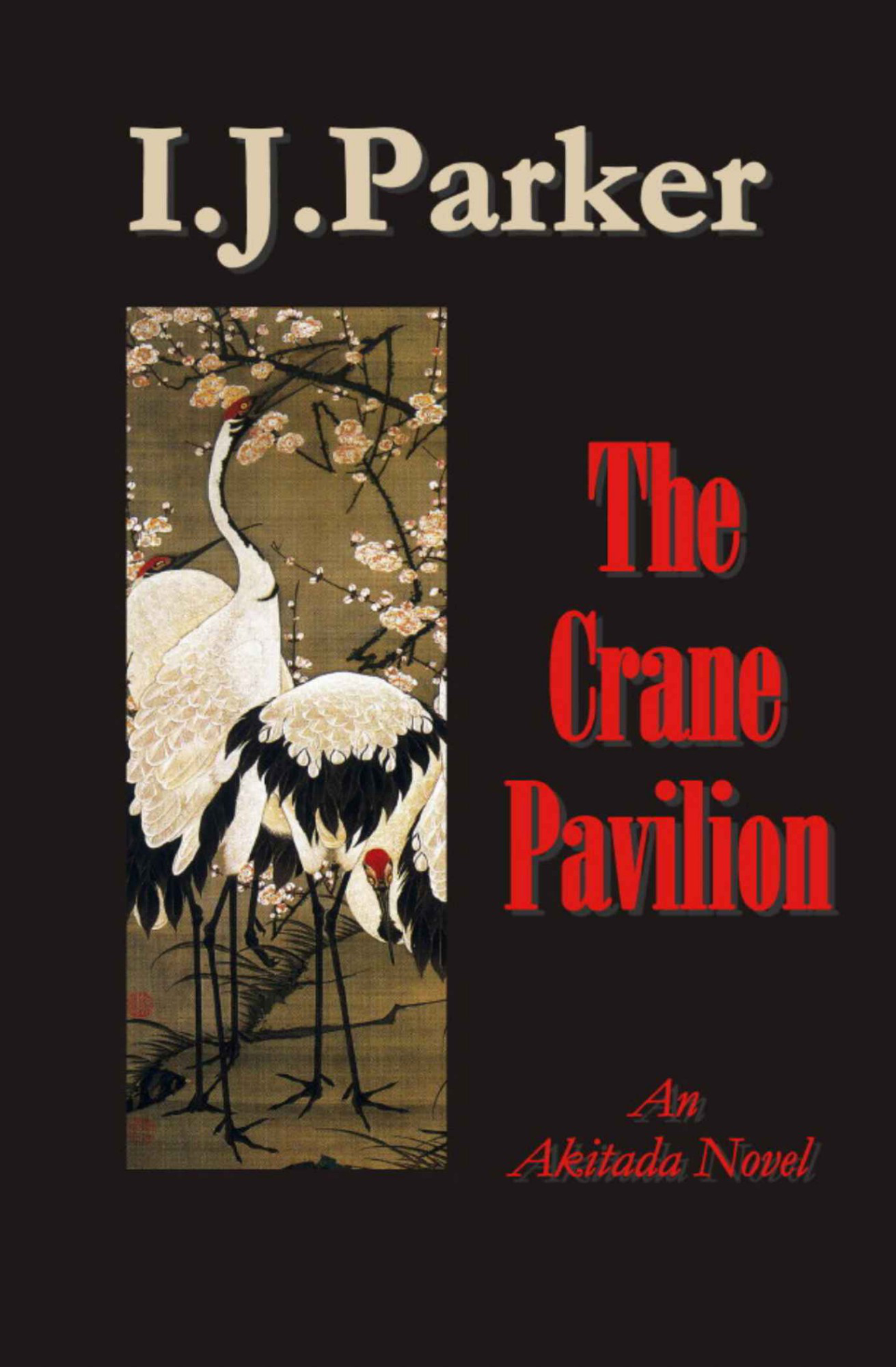 I skipped the book before this after reading the blurb for this book.
I skipped the book before this after reading the blurb for this book.
After the loss of his wife and newborn son, Akitada returns home, ostensibly to care for his motherless children, but really to withdraw from the world into his grief. When his friends and family join in an effort to draw him out of his seclusion by tempting him with a mystery, he responds halfheartedly until he becomes intrigued by the young woman's alleged suicide and the slipshod way in which the police investigated. But more serious problems arise: he faces dismissal and punishment for having left his last post without permission. Then Tora and Saburo are arrested for the murder of a gambler. Their dilemma forces Akitada to delve into the world of a gangster boss who controls gambling and prostitution, and this time Akitada will not escape.
No interest in reading about the death of his wife, so I read this.
I think I'm going to put this series down for awhile. Every book seems to have a major plot thread of Akitada in danger of losing his position. I like the historical bits, and the mysteries are interesting, and I do like how Akitada gets older as the series progresses (and has to deal with these changes in his body and mind) but I'm frustrated by the repetition of his position at court and his constant lack of funds.
Published by Ingrid J. Parker Inc.
August 2016 | Rating: 6.5/10

